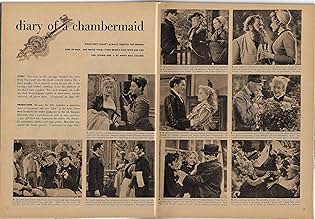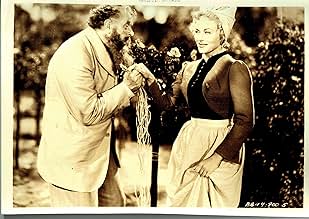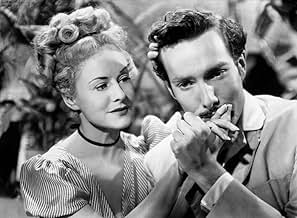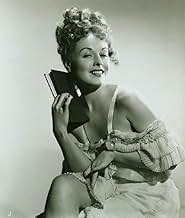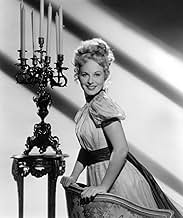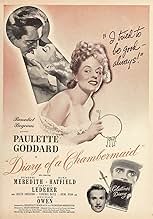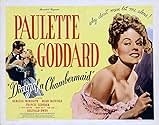IMDb-BEWERTUNG
6,5/10
1590
IHRE BEWERTUNG
Füge eine Handlung in deiner Sprache hinzuA chambermaid plots to climb the social ladder by marrying a wealthy man.A chambermaid plots to climb the social ladder by marrying a wealthy man.A chambermaid plots to climb the social ladder by marrying a wealthy man.
- Auszeichnungen
- 1 wins total
Edward Astran
- Townsman
- (Nicht genannt)
Arthur Berkeley
- Townsman
- (Nicht genannt)
Chet Brandenburg
- Townsman
- (Nicht genannt)
Egon Brecher
- The Postman
- (Nicht genannt)
Jane Crowley
- Townswoman
- (Nicht genannt)
Sumner Getchell
- Pierre
- (Nicht genannt)
Jack Perry
- Townsman
- (Nicht genannt)
Joe Ploski
- Townsman
- (Nicht genannt)
Empfohlene Bewertungen
Chambermaid Paulette Goddard (Celestine) and the feeble, irritating Irene Ryan (Louise) arrive at the stately home in which they are to serve. They first meet the rather unpleasant valet, Frances Lederer (Joseph) before being introduced to Reginald Owen (Captain Lanlaire) and his wife Judith Anderson (Madame Lanlaire), who have an ill son, Hurd Hatfield (George). It becomes clear that it is Goddard's role to make his life better. Can she succeed....?
Paulette Goddard, Frances Lederer and Judith Anderson carry the film in terms of having a good cast but I'm afraid that's it. The film suffers by having too many buffoons - virtually everybody else. While Reginald Owen is OK as a bumbling old man, one is enough for any film. Unfortunately, we are also given Burgess Meredith as an extremely annoying old codger of a neighbour - he must be the most annoying character EVER. He constantly jumps and bounces around just like all old people do - you get my drift? He is so unconvincing that it's embarrassing. He is meant to be a likable, cheeky chappy. He isn't. Frances Lederer has a great moment with him towards the end of the film. Marvelous!
Frances Lederer keeps the tension ticking and is very watchable as the valet with something sinister going on in his head. The plot is good and keeps us watching as to how things will pan out for Goddard. Time to check the silverware.
Paulette Goddard, Frances Lederer and Judith Anderson carry the film in terms of having a good cast but I'm afraid that's it. The film suffers by having too many buffoons - virtually everybody else. While Reginald Owen is OK as a bumbling old man, one is enough for any film. Unfortunately, we are also given Burgess Meredith as an extremely annoying old codger of a neighbour - he must be the most annoying character EVER. He constantly jumps and bounces around just like all old people do - you get my drift? He is so unconvincing that it's embarrassing. He is meant to be a likable, cheeky chappy. He isn't. Frances Lederer has a great moment with him towards the end of the film. Marvelous!
Frances Lederer keeps the tension ticking and is very watchable as the valet with something sinister going on in his head. The plot is good and keeps us watching as to how things will pan out for Goddard. Time to check the silverware.
This film is not to be confused with the film by the same name which was made in 1964 by the famed director Luis Buñuel. While the theme of a conniving maid who is using her wiles to get ahead is in both and they have the same name, otherwise the films are very dissimilar--mostly because the bizarreness of Buñuel's version is missing. No foot fetishes, no rape, no murder and no antisemitism in the 1946 film! Jean Renoir's vision for the story is light-years different from Buñuel's. Personally, I think both versions have their strengths and both have their flaws, but I think the latter version is a bit better.
Paulette Goddard plays the title role. She is a conniving woman who comes to her new home as a maid in order to marry a rich man. She's mostly interested in the master's son--but the young man is an indifferent suitor at best (Hurd Hatfield). There's also the old and VERY wacky neighbor (Burgess Meredith) and the valet--played in a very creepy manner by Francis Lederer. Who will she get by the end of the film? And, unfortunately, who care? My biggest problem with this film is Goddard. I have long wondered why she got so many plum roles as she was only a fair actress--and here she often overplays her part. Any sort of subtlety is missing from her portrayal--and the role really needed this, as the woman SHOULD have been played like a master manipulator. As far as the direction goes, it wasn't bad--and had the nice look Jean Renoir was noted for in his films. But he probably should have reigned in a few of the more florid portrayals (not just Goddard's)--though Lederer was BRILLIANT and the best thing about the film. Also, Goddard's character was a bit too sympathetic--she should have been much more amoral and manipulative in order to make the movie more enjoyable. Overall, I prefer the 1964 version a bit more--though I think this film could use yet another remake--one that is more subtle and without the weird 'extras' Luis Buñuel put in his film that tended to distract the viewer. Worth seeing but nothing more--and it should have been better. A great script idea that should have been even better--and juicier.
FYI--Burgess Meredith and Paulette Goddard were married while they were making this film. Seeing Meredith wearing so much makeup and playing a very old man was rather funny--as they are almost the same age.
Paulette Goddard plays the title role. She is a conniving woman who comes to her new home as a maid in order to marry a rich man. She's mostly interested in the master's son--but the young man is an indifferent suitor at best (Hurd Hatfield). There's also the old and VERY wacky neighbor (Burgess Meredith) and the valet--played in a very creepy manner by Francis Lederer. Who will she get by the end of the film? And, unfortunately, who care? My biggest problem with this film is Goddard. I have long wondered why she got so many plum roles as she was only a fair actress--and here she often overplays her part. Any sort of subtlety is missing from her portrayal--and the role really needed this, as the woman SHOULD have been played like a master manipulator. As far as the direction goes, it wasn't bad--and had the nice look Jean Renoir was noted for in his films. But he probably should have reigned in a few of the more florid portrayals (not just Goddard's)--though Lederer was BRILLIANT and the best thing about the film. Also, Goddard's character was a bit too sympathetic--she should have been much more amoral and manipulative in order to make the movie more enjoyable. Overall, I prefer the 1964 version a bit more--though I think this film could use yet another remake--one that is more subtle and without the weird 'extras' Luis Buñuel put in his film that tended to distract the viewer. Worth seeing but nothing more--and it should have been better. A great script idea that should have been even better--and juicier.
FYI--Burgess Meredith and Paulette Goddard were married while they were making this film. Seeing Meredith wearing so much makeup and playing a very old man was rather funny--as they are almost the same age.
Octave Mirbeau's brilliant, chilling novel was written more than 100 years ago, but its sordid, sexy, near-surrealistic mood and story could not possibly be given a worthy treatment in 1946, and certainly not in an America still subject to the Hays code. This film takes only some of the incidents in the episodic novel and tries to make the story into an eccentric romantic comedy. But, minus the mood and ambiance of the novel, the result is awkward and odd. An important aspect of the novel, anti-semitism (the book was written when France was torn apart by the Dreyfus case) is completely left out, and, instead of perversion and cruelty, Celestine experiences, from her employers, only annoyance. The performances are lightweight, except for Francis Lederer (always good at gentlemanly brutes) as the sinister valet. The film's only moments of horror occur when he indulges his talent, and taste, for discreet violence.
Nothing the great Renoir directed is without interest, and this Diary certainly has moments of beauty and affectionate comedy. But a much more accurate adaptation was Bunuel's in 1964. He left in the anti- semitism, and his own sexy-sadistic-surrealistic mood was a perfect match for Mirbeau's. One moment in this story reminded me of a similar incident, one of my favourites in a Bunuel film. The family for whom the chambermaid works lives next to a peppery, eccentric old man who demonstrates his loathing for his neighbours by throwing rocks through the panes of their greenhouse. In The Exterminating Angel, the partygoers are frightened when a brick is thrown through the window. The host calms them with "It's nothing. Just a passing Jew." Priceless!
Nothing the great Renoir directed is without interest, and this Diary certainly has moments of beauty and affectionate comedy. But a much more accurate adaptation was Bunuel's in 1964. He left in the anti- semitism, and his own sexy-sadistic-surrealistic mood was a perfect match for Mirbeau's. One moment in this story reminded me of a similar incident, one of my favourites in a Bunuel film. The family for whom the chambermaid works lives next to a peppery, eccentric old man who demonstrates his loathing for his neighbours by throwing rocks through the panes of their greenhouse. In The Exterminating Angel, the partygoers are frightened when a brick is thrown through the window. The host calms them with "It's nothing. Just a passing Jew." Priceless!
France's most famous director, Jean Renoir, had to go to America to make his film of French author Octave Mirbeau's novel "The Diary of a Chambermaid". It was adapted for the screen by the actor Burgess Meredith, mainly as a vehicle for his then wife Paulette Goddard who plays the chambermaid Celestine who uses her wiles on the various men in the household where she is employed. It's a lovely performance in a film full of good performances. Others in the cast include Meredith himself, Hurd Hatfield, Reginald Owen and Judith Andereson but it's Francis Lederer as the malevolent manservant Joseph who walks off with the movie.
It's really a film of two halves. The early farcial elements seem overworked, (I know it's a film about eccentrics but such broad strokes hardly suit Renoir). However, the darkness that overwhelms the second half of the picture is magnificently handled by the director and is actually quite shocking. This is a very different film from the one Bunuel made in 1964 and perhaps all the better for it.
It's really a film of two halves. The early farcial elements seem overworked, (I know it's a film about eccentrics but such broad strokes hardly suit Renoir). However, the darkness that overwhelms the second half of the picture is magnificently handled by the director and is actually quite shocking. This is a very different film from the one Bunuel made in 1964 and perhaps all the better for it.
I cannot pretend to explain all the allusions and metaphors Renoir intended to convey with this impressionistic comedy. Paulette Goddard, as the main character, is magnificent. She conveys her feelings and thoughts through her diary, but in a manner that is always blurry and full of confusion. And speaking of confusion, Hurd Hatfield is on hand as the scion of the odd home. Burgess Meredith, Francis Lederer, and Irene Ryan all add terrific seriocomic support in their roles.
Be prepared to experience many conflicting feelings while viewing this film.
Be prepared to experience many conflicting feelings while viewing this film.
Wusstest du schon
- WissenswertesIt is sometimes said that this was the only film Jean Renoir made entirely inside a studio.
- PatzerWhen the Captain (Meredith) is going to the July 14 celebration, the shadow of the boom and mic are visible.
- Zitate
Georges Lanlaire: I never found the urge to live or die on a big scale.
- VerbindungenReferenced in Tiovivo c. 1950 (2004)
Top-Auswahl
Melde dich zum Bewerten an und greife auf die Watchlist für personalisierte Empfehlungen zu.
- How long is The Diary of a Chambermaid?Powered by Alexa
Details
- Laufzeit
- 1 Std. 26 Min.(86 min)
- Farbe
- Seitenverhältnis
- 1.37 : 1
Zu dieser Seite beitragen
Bearbeitung vorschlagen oder fehlenden Inhalt hinzufügen

